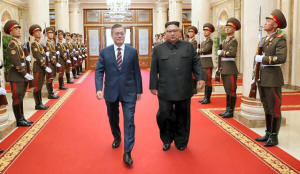|
North Korea's Kim says summit with Trump
stabilized region, sees more progress
 Send a link to a friend
Send a link to a friend
 [September 18, 2018]
By Hyonhee Shin and Joyce Lee [September 18, 2018]
By Hyonhee Shin and Joyce Lee
SEOUL (Reuters) - North Korean leader Kim
Jong Un said on Tuesday his "historic" summit with U.S. President Donald
Trump in Singapore stabilized regional security, and that he expected
further progress at an inter-Korean summit aimed at reviving stalled
nuclear diplomacy.
Kim thanked South Korea's President Moon Jae-in for bringing about the
Singapore meeting in June as the two leaders began their third round of
talks in Pyongyang.
"Thanks to that, the political situation in the region has stabilized
and I expect more advanced results," Kim told Moon, referring to the
Singapore gathering, at the start of their talks.
The Kim-Moon summit will be a litmus test for another meeting Kim has
recently proposed to Trump, with the South Korean president seeking to
engineer a proposal that combines a framework for the North's
denuclearization and a joint declaration ending the 1950-53 Korean War.
Moon expressed gratitude for Kim's "bold decision to open a new era".

The first session of the talks, which lasted for two hours, were held at
the headquarters of the North's ruling Workers' Party Central Committee,
with party vice chairman Kim Yong Chol and Kim Jong Un's sister Kim Yo
Jong, as well as South Korea's national security adviser Chung Eui-yong
and spy chief Suh Hoon in attendance.
LIMOUSINE PARADE
Earlier, the leaders paraded down the streets of Pyongyang in Kim's
black Mercedes limousine to loud cheers from nearly 100,000 North
Koreans who waved flowers and chanted "Motherland!Unification!"
Kim greeted Moon with hugs and handshakes as the South Korean leader
landed in the North's capital with a mission to rekindle momentum in
faltering talks between Washington and Pyongyang over denuclearization
and a formal end to the 1950-53 Korean War.
As Kim escorted Moon to the Paekhwawon State Guest House, where Moon
will stay during his three-day visit, Kim said he wanted to produce a
"bigger outcome at a faster pace" than the two leaders have achieved so
far.
Moon, himself the offspring of a family displaced by the war, has met
Kim twice this year at the border village of Panmunjom.
"You Mr. President are traveling all around the world, but our country
is humble compared with developed nations," Kim told Moon. "I've been
waiting and waiting for today. The level of the accommodation and
schedule we provide may be low, but it's our best sincerity and heart."
Moon said it was "time to bear fruit" and thanked Kim for his
hospitality, which included a massive welcome ceremony at Pyongyang
International Airport featuring a large, goose-stepping honor guard and
a military band.
During their motor parade through Pyongyang's landmark Ryomyong Street,
a new residential district launched last year under Kim's initiative to
modernize the city, Kim and Moon briefly stepped out of the vehicle to
greet and take flowers from members of the crowd.
"CHIEF NEGOTIATOR"
Trump has asked Moon to be "chief negotiator" between himself and Kim,
according to Moon's aides, after Trump canceled a trip to Pyongyang by
his secretary of state last month.
[to top of second column]
|

South Korean President Moon Jae-in is greeted by North Korean leader
Kim Jong Un as he arrives at the headquarters of the Central
Committee of the Workers' Party of Korea for their meeting in
Pyongyang, North Korea, September 18, 2018. Pyeongyang Press
Corps/Pool via REUTERS

Washington wants to see concrete action toward denuclearization by North
Korea before agreeing to a key goal of Pyongyang - declaring an end to
the 1950-53 Korean War.
The conflict ended with an armistice, not a peace treaty, leaving
U.S.-led U.N. forces including South Korea technically still at war with
the North.
South Korea is pinning high hopes on Kim's remarks to Moon's special
envoys earlier this month that he wants to achieve denuclearization
within Trump's first term in office ending in early 2021.
"If North Korea-U.S. dialogue is restarted after this visit, it would
have much significance in itself," Moon said before his departure.
Underscoring the challenges ahead, North Korea's official Rodong Sinmun
said on Tuesday "the responsibility falls squarely on the United States"
for the stalled nuclear discussions.
"It is due to its nonsensical, irrational stubbornness that other issues
can only be discussed after our country has completely verifiably,
irreversibly dismantled our nuclear capabilities... without showing the
intention to build trust including declaring the end of war," the
newspaper said in an editorial.
On Wednesday, Moon and Kim plan to hold a second day of official talks
after which they are expected to unveil a joint statement, and a
separate military pact designed to defuse tensions and prevent armed
clashes. Moon will return home early Thursday.
Traveling with Moon are South Korean business tycoons, including Samsung
scion Jay Y. Lee and the chiefs of SK Group and LG Group. They met North
Korean Deputy Prime Minister Ri Ryong Nam, who is in charge of economic
affairs, although Seoul officials said they did not expect any specific
joint economic projects to be agreed given extensive international
sanctions.
The United States is pressing other countries to strictly observe U.N.
sanctions aimed at choking off funding for Pyongyang's nuclear and
ballistic missile programs.

North Korea says it has destroyed its main nuclear and missile engine
test site and has halted atomic and ballistic missile tests, but U.S.
officials and analysts believe it is continuing to work on its weapons
plans covertly.
U.S. Ambassador to the United Nations Nikki Haley accused Russia on
Monday of "cheating" on U.N. sanctions on North Korea.
(Reporting by Hyonhee Shin, Joyce Lee, Soyoung Kim and Pyongyang Press
Corps; Editing by Lincoln Feast and Alex Richardson)
[© 2018 Thomson Reuters. All rights
reserved.]
Copyright 2018 Reuters. All rights reserved. This material may not be published,
broadcast, rewritten or redistributed.
Thompson Reuters is solely responsible for this content. |